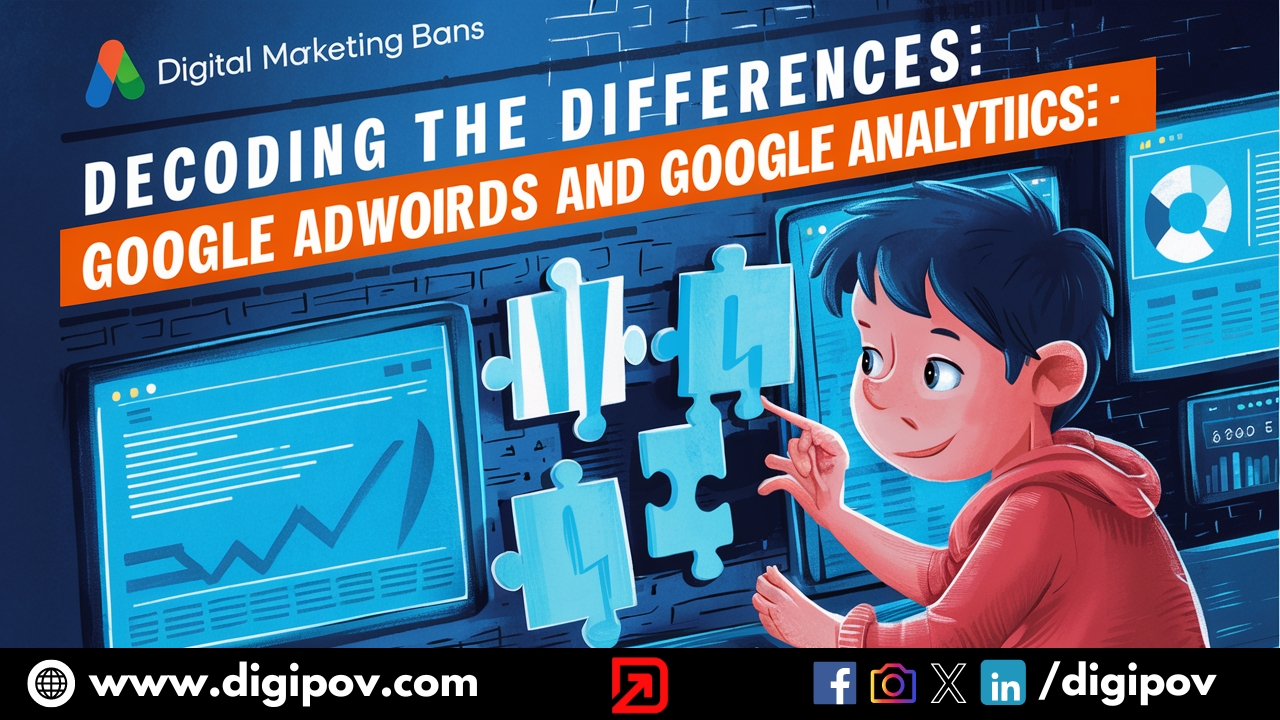As we know digital marketing is at a boom nowadays, Google also offers various tools for enhancing your digital experience. In the growing craze of digital marketing, people often ask – How are Google AdWords and Analytics different from each other?
Google AdWords helps businesses advertise by choosing keywords and showing adwords to the right people. While Google analytics provides information about the visitors of websites and what action they performed.
If you are also curious and want to explore the best answer about the differences between these Google tools you are at the right destination. So , let’s dive deeper into this comprehensive guide to gain valuable insights about two prominent Google tools and their differences.
Understanding Google Analytics:
It is a web based analytics service offered by Google. It is used to analyze and report website traffic, user behavior and other important metrics.
It provides all the valuable information regarding users’ interaction with a website or app, helping businesses make data-driven decisions to enhance and enhance their website and improve performance.
Main features of Google Analytics:
Google analytics tool offers various features such as:-
1. Traffic Analytics: The ability to generate detailed reports on your website traffic by analyzing the traffic which includes information such as visitors, page views, bounce rate and session duration is the prominent feature of this tool.
By analyzing traffic patterns , marketers can gain valuable insights into audience behavior and preferences and adjust their strategies.
2. Audience: This tool has a prominent ability to provide detailed views of your audience on your website. Age, gender, location and demographic characteristics allow marketers to change strategies to better target specific groups.
3. Behavioral Analytics: Google Analytics goes beyond surface-level metrics and provides insight into user behavior on your website. By identifying popular pages, navigation paths, and conversion paths, marketers can identify areas they need to improve and optimize for users to increase conversion rates.
4. Results Tracking: Google Analytics provides an effective tracking method to measure campaign performance. Marketers can track predefined goals, such as form submissions, sales and other desired actions, and measure the impact of their campaigns precisely.
Understanding Google AdWords:
Google AdWords, now known as Google Ads, is an advertising platform which complements the analytical capabilities of Google Analytics. It has the ability to create, manage and optimize online advertising campaigns. Using a pay-per-click (PPC) model, Google AdWords allows marketers to target their specific audience directly to drive traffic, referrals and revenue to their website. Here, the marketer pays the amount only when their websites are being clicked, hence it’s given a name pay-per-click.
Main features of Google AdWords:
Some of the key features of Google AdWords include:-
1. Keyword aiming: The smart keyword aiming in Google AdWords is vital. Advertisers can pick keywords linked to their ads that pop up when users search those terms on Google. This sharp aiming lets ads hit the right group more closely, making ads more fitting.
2. Ad types: Google AdWords has many ad formats for different aims and plans. The tool offers various ways to reach people across places and gadgets, raising brand notice and sales.
3. Budget control: Google AdWords lets advertisers handle their ad money well. They can set a daily spend or limit on campaigns, letting them plan funds smartly and change prices based on live data for the best returns.
4. Ad management: Good ad management matters in online advertising. Google AdWords gives detailed info like views, clicks, click rates, outcomes, and payback. With these numbers, advertisers can fine-tune their ads, better their use of AdWords, and boost their ad success.
Comparing Google AdWords vs Google Analytics
Let’s dive more deeper to briefly understand the differences between Google AdWords and Google Analytics through this parallel comparison:-
| Aspects | Google AdWords | Google Analytics |
| Objective | Drive traffic and conversions through targeted advertising campaigns | Analyze website or app performance and user behavior to optimize marketing strategies |
| Focus | Advertising campaign management, keyword targeting, ad performance tracking | Website analytics, tracking metrics like page views, bounce rates, and conversions |
| Data Scope | Ad-related metrics such as impressions, clicks, and conversion rates | Website data including traffic sources, user demographics, and behavior flow |
| Audience | Advertisers, marketers, and businesses creating and optimizing campaigns | Webmasters, marketers, analysts, and businesses analyzing website performance |
| Integration | Integrates with Google Analytics to correlate advertising efforts with website metrics | Can import data from AdWords to analyze advertising impact on website performance |
| Goal Orientation | Achieve advertising objectives like increasing traffic and driving conversions | Understand user behavior, optimize website performance, and refine marketing strategies |
| Tools | Keyword bidding, ad creation, budget management | Traffic sources, user demographics, behavior flow analysis |
| Metrics | Impressions, clicks, click-through rate, conversion rate, ad spend | Page views, sessions, bounce rate, average session duration, goal completions |
| Reporting | Real-time performance data, campaign-specific reports | Customizable reports, segmentation options, attribution modeling |
| Use Case | Directly impact ad visibility and performance | Indirectly improve marketing strategies and user experience |
| Primary Users | Advertisers, marketers, PPC specialists | Webmasters, digital marketers, data analysts |
| Purpose | Drive targeted traffic and conversions through ads | Optimize website performance and user experience |
| Key features | Keyword targeting, ad extensions, audience targeting | Audience segmentation, goal tracking, conversion attribution |
| Optimization | Adjust bids, refine targeting, A/B testing | Content optimization, UX improvements, conversion rate optimization |
| ROI Tracking | Track ad spend vs. revenue generated | Measure website ROI, attribute conversions to specific channels |
| Customization | Customize ad messaging, targeting criteria | Create custom reports, set up custom dimensions, and metrics |
Let us have a more extensive conversation about these Google tools differences.
Differences between Google Analytics and Google AdWords. :
1.Purpose and Function: Google Analytics is all about site analytics that will help you improve your website user experiences by tracking web traffic and user behavior while on the other hand,Google AdWords is a top advertising platform which helps in creation,management and optimization of online marketing campaigns for targeted traffic and results.
2.Data Collection: Age, interests, how they came to the site are some of the things that can be known about those visiting via Google Analytics using web tracking codes. For example, to find out how effective an ad campaign is, it counts impressions or appearances of adverts made through Adsense programs by measuring clicks on ads as well as results achieved among other campaign-specific metrics.
3.Focus on Traffic: Paid and organic sources of traffic data are provided by Google Analytics enabling marketers to assess their online exposure effectively. All google adwords do though is bring in buying visitors through advertising campaigns.
4. Actionable Statistics vs. Campaign Management: Actionable statistics from google analytics that can enable marketers perform effective campaign management such as keyword researching, bid managing and performance tracking to provide measurable results have facilitated continuous improvement in marketing strategies optimization of websites for target groups using tools like google adwords.
5. Customization and Reporting:- Google AdWords marketers can customize reports based on ad performance data such as CTR (click through rate), average CPC (cost per click), conversion rates based reports, campaign goals. Google Analytics also provides several options of customization including custom dashboard segment attribution models that facilitate deep analysis of various aspects of user activity in website performance.
6. Attribution Modeling:- In Google AdWords, attributions distribute performance credit across different ads interactions, aiding marketers improve bidding tactics and manage budgets effectively among campaigns. Additionally, multiple attributions are possible within Google Analytics . Modeling choices even permit first-click-last-click linear location-based time lapse models to assess contact points along the resulting path at different times during interaction.
7. Real versus historical data – Google AdWords tracks changes in campaign data as they happen, providing instant adjustments to fit into market trends. Conversely, Google Analytics puts more weight on historical data analysis, which offers insights into the performance of a business over time enabling it to monitor trends and patterns that can lead to informed strategic decisions.
Conclusion:
In conclusion, these changing trends in digital marketing necessitate the use of Google Analytics and Google AdWords. Marketers have access to website traffic statistics and user behavior through Google Analytics whereas advertisers can develop effective ad campaigns for increasing sales and conversion rates using Google AdWords. By combining the functionalities of both platforms, marketers can come up with an elaborate digital marketing plan that optimizes their brand’s online presence, effectively engages their target market segment and aligns well with business objectives.
These tools are different but used together towards improving your digital journey through marketing. These are among the prominent tools available in google for simplifying digital marketing by automating it digitally. Use these tools if you want to make your site better or enhance its quality.
FAQs:-
Q: What do AdWords mean by Google?
A: Google offers a platform called Google Ads, or rather Google AdWords which is an online platform for tracking, measurement and analysis of user behavior and website traffic. It allows companies to create and manage online adverts that appear on Google’s search engine results page (SERPs) as well as across its network of advertising partners.
Q: What is Google Analytics?
A: The service provided by Google called Google Analytics helps organizations to track and analyze their website’s traffic, user activity, and other analytics so that they can know the success of their online presence and marketing efforts.
Q: How do you differentiate between Google AdWords and Google Analytics?
A: When it comes to creating online advertising campaigns, we use the term ‘Google AdWords’ while ‘Google Analytics’ stands for monitoring website traffic as well as studying customer interaction with a website. Traffic generating is performed by Adwords via paid advertisements while using Analytics one can find out how people are interacting with the site after landing on it.
Q:Can I use both tools at the same time – namely – Ad Words and Analytics?
A: Combining both these tools could result in a comprehensive overview regarding site traffic along with internet advertisement effectiveness. Businesses may monitor the success of their advertising campaigns, examine user behavior, and adjust their marketing strategy by connecting the two platforms.
Q. How do you go about using Google AdWords?
A. With Google AdWords, the pay-per-click (PPC) advertising approach enables advertisers to bid on terms that will reach out to their target market. When visitors type in certain phrases the ads show up at the top or bottom of the Google search results page. Therefore, it is referred to as “pay-per-click” because an advertiser only has to pay when a user clicks on their advertisement.
Q: What can be tracked by Google Analytics?
A: Several things are traceable through Google analytics; such as website traffic, user demographics, activity by users (including visiting pages, length of session, and bounce rates), conversion rates among others. Additionally, it can also show how well user acquisition strategies work, marketing initiatives perform and website content does.
Q: Are there any costs associated with using Google AdWords or Google Analytics?
A: Both Google Analytics and free versions of AdWords have basic functionalities but while running their advertisements via it, businesses that use Google AdWords must spend some amount for each click or impression made on them. Besides this there is a paid version of google analytics called “Google Analytics 360”, which offers more advanced features and support for larger businesses but comes with a monthly fee.
Q: Is it possible for Google AdWords and Google Analytics to enhance the functionality of my website?
A: It is true that combining Google AdWords with Google Analytics can improve the performance of your website by revealing information about which advertising campaigns generate the most traffic, which keywords work best, and how users engage with the website after clicking on an advertisement.
Q: How do I set up Google AdWords and Google Analytics for my website?
A : If you want to set up Google AdWords, you must create an account and set up a campaign. This includes choosing goals, keywords, creating ads, budgets, and more. To set up Google Analytics, you need to create an account, add tracking code to your website, and configure your settings to track specific metrics. Both platforms offer guides and tutorials to help you get set up.
Q: Can I track conversions using Google AdWords and Google Analytics?
A: Yes and we use Google AdWords and Google Analytics. You can follow the changes as AdWords provides conversion tracking tools to measure actions such as website sales, form submissions, and phone calls resulting from your ad. Google Analytics monitors your website traffic and also offers conversion tracking, which tracks user actions that lead to conversions.



